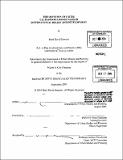| dc.contributor.advisor | Anna Hardman. | en_US |
| dc.contributor.author | Emmert, Mark David, 1971- | en_US |
| dc.contributor.other | Massachusetts Institute of Technology. Dept. of Urban Studies and Planning. | en_US |
| dc.date.accessioned | 2005-09-27T18:24:05Z | |
| dc.date.available | 2005-09-27T18:24:05Z | |
| dc.date.copyright | 2004 | en_US |
| dc.date.issued | 2004 | en_US |
| dc.identifier.uri | http://hdl.handle.net/1721.1/28798 | |
| dc.description | Thesis (M.C.P.)--Massachusetts Institute of Technology, Dept. of Urban Studies and Planning, 2004. | en_US |
| dc.description | Includes bibliographical references (p. 125-139). | en_US |
| dc.description.abstract | (cont.) humanitarian role? (4) How do these organizations deal with the ICRC's humanitarian principles of neutrality, impartiality and independence? To answer these questions, I analyze organizational documents, examine USAID reports and IRS tax forms, as well as interview staff members of six US-based FBOs. This thesis uses a continuum as the primary framework to analyze the relevant dimensions of an organization's religious identity. The continuum is based on six criteria: self-identity; participants; resources; mission, vision and goals; organizational interaction; and cultural congruence of the host countries. Ultimately, the continuum provides a means to differentiate between these organizations and to shed light on the challenges and tensions that each organization may encounter in the field of international relief and development. The findings show that, although each provides secular products and services, the six organizations appear to exhibit significant differences in their religious identity, resource base, hiring practices and organizational interaction, as well as differences in their cultural congruence with host countries. These differences and their potential implications warrant further study. | en_US |
| dc.description.abstract | Faith-based organizations (FBOs) capture public attention now more than at any other time in recent history. The U.S. government, under the leadership of President George W. Bush, has strongly urged American religious organizations to take an active role in the provision of public services. To encourage the involvement of these organizations, the federal government has loosened its purse strings and made an increasing number of federal funds more accessible. At the same time, faith-based organizations have come to play an increasingly important role in the field of international relief and development assistance. Their expanding international presence along with greater access to public resources makes the topic of religious organizations very timely. The underlying motivation of this thesis is therefore to stimulate discussion and research on the subject of faith-based organizations involved in international relief and development activities by examining how U.S.-based religious organizations reconcile their unique organizational identity with the secular demands of public-sector work. This thesis addresses four critical questions about the roles and responsibilities of religious organizations: (1) How do American faith-based organizations reconcile the religious component of their organizational identity with the secular demands of public-sector work in the field of international relief and development? (2) How do these organizations balance their religious mandate with the bureaucratic and professional standards imposed by government agencies, as well as the intense and potentially conflicting social and cultural demands imposed on them in complex humanitarian emergencies? (3) How do these organizations perceive their | en_US |
| dc.description.statementofresponsibility | by Mark David Emmert. | en_US |
| dc.format.extent | 173 p. | en_US |
| dc.format.extent | 13385489 bytes | |
| dc.format.extent | 13407062 bytes | |
| dc.format.mimetype | application/pdf | |
| dc.format.mimetype | application/pdf | |
| dc.language.iso | en_US | |
| dc.publisher | Massachusetts Institute of Technology | en_US |
| dc.rights | M.I.T. theses are protected by copyright. They may be viewed from this source for any purpose, but reproduction or distribution in any format is prohibited without written permission. See provided URL for inquiries about permission. | en_US |
| dc.rights.uri | http://dspace.mit.edu/handle/1721.1/7582 | |
| dc.subject | Urban Studies and Planning. | en_US |
| dc.title | The question of faith : U.S.-based religious NGOs in international relief and development | en_US |
| dc.type | Thesis | en_US |
| dc.description.degree | M.C.P. | en_US |
| dc.contributor.department | Massachusetts Institute of Technology. Department of Urban Studies and Planning | |
| dc.identifier.oclc | 60249927 | en_US |
